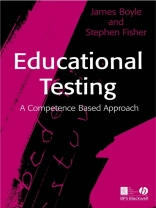Educational Testing provides support for those undertaking training in, and for training providers of, the Certificate of Competence in Educational Testing (CCET) (Level A). Developed by the British Psychological Society (BPS) the CCET aims to meet a need for standards for the use of tests in education in the UK, to encourage responsible test use by psychologists and non-psychologists alike.
Written by the designers of the certificate and endorsed by the BPS’s Steering Committee on Test Standards, Educational Testing is the only book of its kind available:
* Covers the 71 elements of the CCET in detail and acts as a ‘course text’ for those in training
* Describes each core competence
* Provides model answers and examples
* Offers an indication of the range of ways in which the core competences may be assessed by the Assessor, based upon the existing BPS Guidance for Assessors document
* Appendices offer guidance on BPS Standards, a glossary of technical terms, useful web-sites and on-line resources and Test Publishers Addresses.
表中的内容
Preface.
Part I: From Dualism to Common-sense Functionalism.
1. The Flight from Dualism.
The Issue Between Dualism and Materialism.
Supervenience.
Possible Worlds: An Introduction.
Annotated Reading.
2. Behaviourism and Beyond.
The Case for Behaviourism.
Methodological and Revisionary Behaviourism.
Problems for Behaviourism.
The Path to Functionalism via a Causal Theory.
The Causal Theory of Mind.
Annotated Reading.
3. Common-sense Functionalism.
Multiple Realizability.
Common-sense Functionalism Expounded.
Interconnections without Circularity.
Behaviour Characterized in Terms of Environmental Impact.
What Does Common Sense Say about the Mind?.
Annotated Reading.
Part II: Rivals and Objections.
4. Theory of Reference.
The Description Theory of Reference.
The Causal Theory.
The Necessary A Posteriori.
Annotated Reading.
5. Empirical Functionalisms.
Common-sense Functional Roles as a Reference-fixing Device.
Chauvinism and Empirical Functionalism.
Annotated Reading.
6. The Identity Theory.
The Identity Theory and Functionalism.
Some Early Objections to the Identity Theory.
Token-Token versus Type-Type Identity Theories.
Essentialism about Psychological States.
Annotated Reading.
7. Four Challenges to Functionalism.
The China Brain.
The Chinese Room.
Blockhead.
The Zombie Objection.
Annotated Reading.
8. Phenomenal Qualities and Consciousness.
The Question of Qualia.
Consciousness.
Representationalism and Perceptual Experience.
Annotated Reading.
9. Instrumentalism and Interpretationism.
Instrumentalism.
Interpretationism.
Annotated Reading.
Part III: About Content.
10. The Language of Thought.
The Language of Thought Hypothesis.
The Map Alternative.
Annotated Reading.
11. Content.
What is the Problem of Content?.
The Map Theory.
The Internal Sentence Theory.
Problems for the Map-system Theory.
Problems and Questions for the Internal Sentence Theory.
Annotated Reading.
12. Connectionism.
Connectionism and the Map-system Theory.
Annotated Reading.
13. Broad and Narrow Content.
Narrow Content.
Broad Content.
Deflationism about Broad Content versus Scepticism about Narrow
Content.
Annotated Reading.
Part IV: Explaining Behaviour: Eliminativism and
Realism.
14. Eliminative Materialism.
The Case for Eliminativism.
The Functionalist Reply to Eliminativism.
Natural Kinds and Scientific Reductions.
Annotated Reading.
15. Psychological Explanation and Common-sense
Functionalism.
Three Questions for Common-sense Functionalism.
Annotated Reading.
Glossary.
Bibliography.
Index
关于作者
James Boyle is Reader in Educational Psychology at the
University of Strathclyde, and is chair of the group that put
together the CCET.
Stephen Fisher is Senior Lecturer in Occupational
Psychology at the University of Strathclyde.












